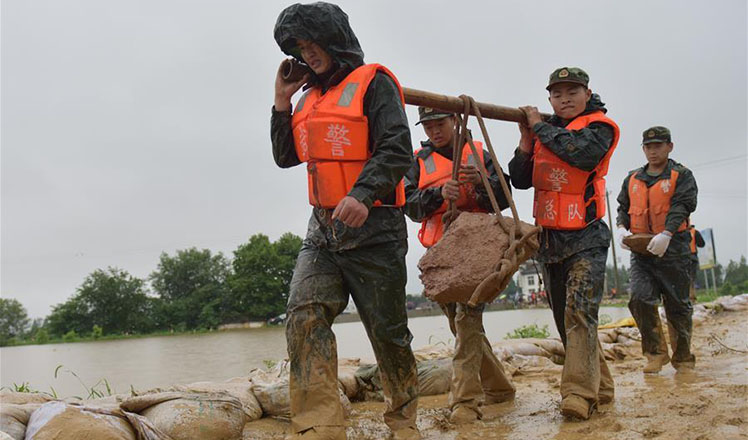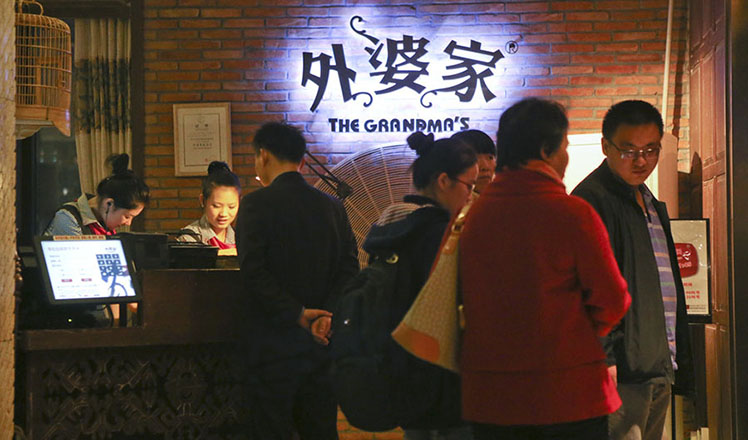Mainland informs Hong Kong on management of bookseller case
Updated: 2016-07-06 15:12
(Xinhua)
|
||||||||
BEIJING - Mainland police passed on the details of their handling of the case of bookseller Lam Wing-kee to a Hong Kong delegation on Tuesday while discussing a mutual notification system between police.
Lam Wing-kee, 61, was detained last year in the mainland for running an illegal book selling businesses. At a press conference in Hong Kong on June 16, Lam, on bail at the time and accompanied by local legislator Albert Ho Chun-yan, claimed that he was mistreated, banned from meeting relatives and refused a lawyer while under alleged house arrest.
He also accused mainland police of breaking the "one country, two systems" policy.
His remarks stirred debate across China and internationally.
Hong Kong and mainland agreed to meet and discuss improving the current notification mechanism.
APPREHENDED FOR SUSPECTED ILLEGAL BUSINESS OPERATIONS
In the first half of 2015, police in the eastern city of Ningbo found that books produced outside the Chinese mainland were illegally sold to the city.
Investigation led police to a woman surnamed Hu, purportedly Lam's girlfriend, in southern Guangdong Province, who was suspected of mailing a large number of books to Ningbo and other parts of the mainland. Some buyers told police that they had bought books from Hong Kong's Causeway Bay Books store managed by Lam and provided payment details. In September 2015, Ningbo police began a formal investigation into the involvement of Lam and others.
Between Oct. 17 and 24, 2015, suspects including Lam and Hu were detained in cities including Shenzhen and Dongguan and later placed under surveillance.
As early as in September 2012, Lam was penalized by customs authority in Shenzhen for bringing illegal publications to the mainland.
After that, Lam and his accomplices attempted to elude regulators with fake book covers and either mailed books directly to mainland buyers or used intermediaries like Hu. Buyers made payments totaling more than 400,000 yuan (60,000 U.S. dollars) into relevant mainland bank accounts.
According to Lam, most of the books were filled with "made-up stuff."
"The more horrifying the titles are, the more readers they draw, the better they sell. The content is mostly fabricated out of stories from the Internet or magazines. It takes about a month to put a book together," Lam told investigators.
After confessing, Lam said he was elderly, in poor health, and fully understood his mistakes.
"I hope to be given leniency," he said, promising never again to engage in illegal bookselling.
In March, Lam was released on bail. Upon his request, police helped him find a residence and a job in Guangdong. On June 2, Lam asked for permission to return to Hong Kong for personal reasons and, pledging to abide by all the rules of his bail, his request was approved.
TELLING LIES TO THE PRESS
What Lam had said at his press conference has been met with astonishment by many of the major players.
His girlfriend Hu, 37, said Lam had "brainwashed" her into sending books by courier, but he had never told her it was illegal. She also repudiated Lam's claim that he had been forced to sign a document waiving his right to a lawyer or speak with members of his family.
According to Hu, they were both told of their right to contact family and hire lawyers but gave up the right because they did not want their families to know they were having an affair, a statement confirmed by police.
Video records provided by Ningbo police show that Lam was well treated during his stay in the mainland. Police sent him fruit, took his blood pressure every day and arranged for him to have his hair cut.
Chen Weiqing, curator of a library in Guangdong who gave Lam a job, was angered and shocked upon hearing Lam's "lies."
"Lam claims he was confined in Shaoguan. That is totally inconsistent with the facts," said Chen. On the contrary, Chen offered him a job to show sympathy given his age. Everyone at the library can attest that during his stay at in Shaoguan he was in good shape and even gained weight, said Chen, adding they traveled together to local resort and had many pleasant chats.
"As a facility open to the public, Lam came and went as he pleased, working and reading. How can he claim that he was not free? Is the library a prison?" said Chen.
"In my mind Hong Kong is a society championing rule of law, but why has it allowed Lam to tell overt lies to the world?" asked Chen, believing that Lam had been coerced into doing so.
According to the police, by declaring his intention not to return to the mainland, Lam has violated the terms of his bail. Ningbo police urged Lam to return to the mainland, otherwise they will be forced to take other legal measures.
'ONE COUNTRY, TWO SYSTEMS' REMAINS INTACT
"The Lam Wing-kee case had been handled in accordance with the law from the beginning to the end. The process respected the HK judicial system, strictly adhered to the stipulations of 'one country, two systems,' and there was no so-called 'cross-border law enforcement' nor tracking or control of the suspect," said a Ningbo police statement.
Law professor Song Xiaozhuang from Shenzhen University believes mainland police have jurisdiction over Lam's case, as the acts and consequences of his crime occurred in the mainland. Moreover, the freedom of speech claimed by Lam should also be enjoyed within a legal framework, therefore, mainland police have not violated the "one country, two systems" policy.
Song suggested mainland and Hong Kong establishing a mutual judicial assistance mechanism on criminal cases between, which was also echoed by Liu Cheng, associate law professor with Sun Yat-sen University.
Liu insists that the judicial assistance agreement should be based on the "one country" principle.
"When people stress 'two systems,' they often neglect the 'one country' aspect of the premise," said Liu. "Hong Kong people are, of course, Chinese people. 'One country' is the bottom line of the agreement, under which authorities will only consider the facts of a criminal case rather than whether the suspect is located in Hong Kong or the mainland."
- Eid al-Fitr celebrated worldwide
- Swedish PM looking at tightening laws after festival sex attacks
- British PM race cut to 3 hopefuls as 2 contenders exit contest
- Chinese herbalists offer free US treatment
- Obama praises Hillary's judgement hours after FBI's censure
- Rio mayor tells Olympic visitors: 'Don't expect New York or London'

 Solar-powered visitor begins orbiting Jupiter
Solar-powered visitor begins orbiting Jupiter
 Continuous rainfalls affect millions of people across China
Continuous rainfalls affect millions of people across China
 Chinese foodies' top 10 favorite restaurants
Chinese foodies' top 10 favorite restaurants
 Chinese basketball legend Wang Zhizhi bids farewell
Chinese basketball legend Wang Zhizhi bids farewell
 Iceland soccer team gets hero's welcome back home
Iceland soccer team gets hero's welcome back home
 Power giant Hanergy shows its solar concept cars
Power giant Hanergy shows its solar concept cars
 Murray downs Kyrgios; Serena powers into quarters
Murray downs Kyrgios; Serena powers into quarters
 Nanjing's Linggu temple offers best view of fireflies
Nanjing's Linggu temple offers best view of fireflies
Most Viewed
Editor's Picks

|

|

|

|

|

|
Today's Top News
Abe's blame game reveals his policies failing to get results
Ending wildlife trafficking must be policy priority in Asia
Effects of supply-side reform take time to be seen
Chinese State Councilor Yang Jiechi to meet Kerry
Chinese stocks surge on back of MSCI rumors
Liang avoids jail in shooting death
China's finance minister addresses ratings downgrade
Duke alumni visit Chinese Embassy
US Weekly

|

|







